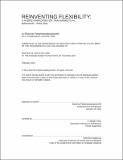| dc.contributor.advisor | J. Meejin Yoon. | en_US |
| dc.contributor.author | Pattamasattayasonthi, Ekachai | en_US |
| dc.contributor.other | Massachusetts Institute of Technology. Dept. of Architecture. | en_US |
| dc.coverage.spatial | a-th--- | en_US |
| dc.date.accessioned | 2011-05-23T15:31:47Z | |
| dc.date.available | 2011-05-23T15:31:47Z | |
| dc.date.copyright | 2011 | en_US |
| dc.date.issued | 2011 | en_US |
| dc.identifier.uri | http://hdl.handle.net/1721.1/62884 | |
| dc.description | Thesis (M. Arch.)--Massachusetts Institute of Technology, Dept. of Architecture, 2011. | en_US |
| dc.description | This electronic version was submitted by the student author. The certified thesis is available in the Institute Archives and Special Collections. | en_US |
| dc.description | Cataloged from student submitted PDF version of thesis. | en_US |
| dc.description | Includes bibliographical references (p. 133). | en_US |
| dc.description.abstract | This thesis asserts that the current form of the proliferating modernization of Thai markets in terms of economic growth and the incorporation of building technology to improve goods storage, attractive envelope, and shopping environment, is actually neither modern nor sustainable for the Thai socio-economic system. Despite fact that Thai Markets have claimed to be modernized over time, they are merely heavily populated for a few hours each day, and otherwise remain barren. Recent reports of the declining state of the Markets also exhibit the failures of the current model of Thai markets, which avow to be modern yet are not sustainable nor competent, creating bigger crisis in Thai urban culture. My thesis argues that the temporal condition of underutilized space and the declining state of Thai markets are in fact architectural problems that need to be resolved spatially and programmatically. This thesis proposes that a new breed of architecture for Thai markets is conceivable and necessary in order for Thai markets to survive while nurturing the rich urban goods distribution, consumption, and dynamic urban spectacles. This thesis will investigate the possibilities of a new paradigm for Thai markets in Bangkok by hybridization between the Thai markets and street markets to create a model that is rather an ephemeral form of architecture, a new multi-functional space for market vending and urban activities, resulting from the braids of streets networks. This place will become a new civic building type --- which is a cross-breed between street and architecture, landscape and buildings --- to assemble the public around their common needs for commodities, leisure, and interaction. | en_US |
| dc.description.statementofresponsibility | by Ekachai Pattamasattayasonthi. | en_US |
| dc.format.extent | 137 p. | en_US |
| dc.language.iso | eng | en_US |
| dc.publisher | Massachusetts Institute of Technology | en_US |
| dc.rights | M.I.T. theses are protected by
copyright. They may be viewed from this source for any purpose, but
reproduction or distribution in any format is prohibited without written
permission. See provided URL for inquiries about permission. | en_US |
| dc.rights.uri | http://dspace.mit.edu/handle/1721.1/7582 | en_US |
| dc.subject | Architecture. | en_US |
| dc.title | Reinventing flexibility : a hybrid paradigm for Thai markets in Bangkok, Thailand | en_US |
| dc.type | Thesis | en_US |
| dc.description.degree | M.Arch. | en_US |
| dc.contributor.department | Massachusetts Institute of Technology. Department of Architecture | |
| dc.identifier.oclc | 723146728 | en_US |
